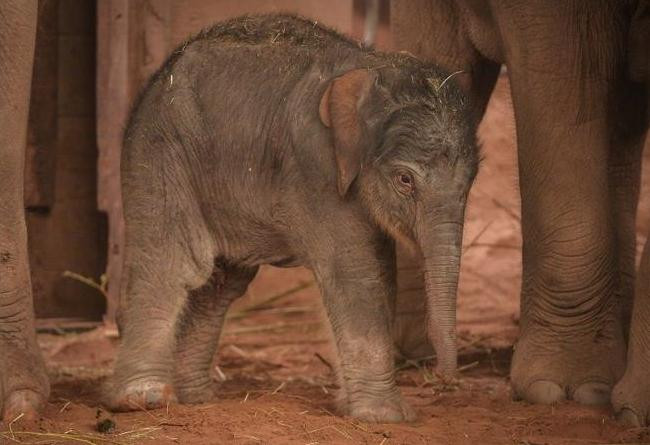Elephant calf birth caught on camera at Chester Zoo [video]
An amazing video has been released that captures on camera the moment an elephant calf was born at Chester Zoo. The CCTV footage, posted on to the zoo's YouTube channel, shows the mother Asian elephant give birth to the baby pachyderm in its enclosure. The female youngster was on her feet within three minutes of being born, according to the zoo.
After a 22-month gestation, 34-year-old mother Thi Hi Way gave birth to the female calf just after 2.30pm on 20 August. Andy Mckenzie, team manager of elephants at Chester Zoo, said the birth went very smoothly.
"We are able to watch the elephants remotely from home on our CCTV cameras so we can track the progress of the labour without disturbing the herd. The birth of a new elephant is a real family occasion and, as the labour progresses, all of the family unit really come together. They all knew that something was going to happen, especially the older elephants that have seen it all before," he said.
"As soon as the calf was born on to the soft sand, the family started to lean down to have a look and a sniff and also gave her a gentle kick to stimulate her. Not long after, she was up and standing on her feet. "We're really pleased with how the birth went and Thi's new calf is a great addition to the Hi Way family," added McKenzie.

Tim Rowlands, curator of mammals at the zoo, said the birth would hopefully raise awareness of the plight Asian elephants face in the wild.
"It's fantastic to be able to celebrate another elephant birth at the zoo and we hope it inspires people to sit up and take notice of the issues these magnificent animals face in the wild," he said.
"African elephants are hunted for their ivory but Asian elephants, which don't have such large tusks, are persecuted in other ways. For example, in India, elephants are injured or even killed in conflicts with humans when they walk into villages and damage crops and property, leading to retaliation in force by villagers.
We're really pleased with how the birth went and Thi's new calf is a great addition to the Hi Way family.
"Chester Zoo runs a fantastic conservation programme in Assam in northern India, which works hard to put an end to this, helping both villagers and wild elephants to live together harmoniously. When people visit and come and see our new calf they may not realise it, but they're actually helping fund this work in the wild," added Rowlands.
The Asian elephant is prevalent throughout south-east Asia from India in the west to Borneo in the east. They are listed as an endangered species by the IUCN (International Union for Conservation of Nature), with destruction of their habitat and poaching leading to their population declining by 50% over the past three generations. The wild population was estimated at between 41,410 and 52,345 in 2003.
© Copyright IBTimes 2025. All rights reserved.






















